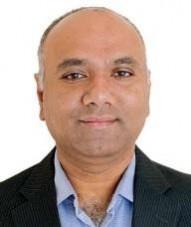
As digital transformations at every scale are taking over the business world, the requirement and rules of leadership have also changed to a great extent. Leaders who can bridge business vision with technical execution stand out as true innovators. One such leader is, Veeravenkata Maruthi Lakshmi Ganesh Nerella, a Sr. Database Administrator at a S&P 500 Company global specialty insurance provider with more than 22 years of experience in IT and digital transformation. From steering complex enterprise solutions to mentoring teams and contributing to social impact, Nerella's journey reflects a commitment to shaping the future of technology while leaving a broader mark on society
In this exclusive interview, Ganesh offers a glimpse of his work, what he has advocated for in a driving change and his ideas for how technology should play a role in addressing the world's problems.
Q: You have more than two decades of tech leadership. What brought you into this field first and foremost? How did your journey progress to where you are today?
Ganesh Nerella: I became interested in technology by observing how systems can make things better in day-to-day life. Throughout my career, I've been lucky enough to work on initiatives that fuse innovation with pragmatic, everyday business needs. Beginning within core IT role and advancing into the enterprise architecture space, I have cantered my attention on aligning digital solutions with strategic objectives. As a SME in Databases and Multi-cloud technologies I build systems that scale, secure and satisfy the organization needs while ensuring that technology accelerates business.
Q: You have driven large database transformations in different industries. What were some of the most significant projects you've worked on?
Nerella: A lot of what I have been working on is to make critical systems more reliable, secure, and scalable. In banking, I was responsible for the development of financial databases, which supported real-time trading for financial institutions dealing with millions of transactions with zero downtime. In telecom, I contributed to billing platforms that enabled rapid subscriber growth by creating accurate customer billing, and I was able to expand services globally. In insurance, I played a leading role in consolidating and stabilizing systems following acquisitions, which was critical to the continuity of business.
None of these projects was merely technical. They had a more direct impact on people's daily livelihoods. Trust is inherent, among other things, when one has access to reliable data about transactions, getting paid by the bank based on an economic factor, or having one's phone work when one needs it.
Q: Much of the coverage puts you at the forefront of FinOps automation. How did that happen, and what was the fallout?
Nerella: As enterprises went to the cloud at scale, there were inconsistent costs. I steered efforts to automate FinOps, or financial operations for cloud platforms, which provided real-time visibility and control over spend, eliminated waste, rationalized usage, and unlocked multi-million-dollar efficiencies, allowing enterprises to reinvest in innovation and customer experience. In a sense, it can turn financial discipline into rocket fuel for growth.
Q: Many of your projects involve complex migrations. What difficulties do you face in transitioning critical systems, and how can they be dealt with?
Nerella: Migrations are high-stakes, because downtime or data loss can be devastating. I've led efforts to move from mainframes and bare-metal Sun Solaris clusters to Linux VM-based environments, as well as cross-platform transformations including migrating on-premises databases to cloud-based technologies cross-technology migrations, often with zero downtime. The key is observability ensuring we have complete visibility into systems before, during, and after migration.
Equally important is automation. I simplify complexity by automating compliance checks, backup procedures, and rollback plans. My methodology combines observability with automation to make migrations resilient and predictable. Ultimately, a successful migration isn't just about moving data; it's about moving trust.
Q: Your frameworks and automation pipelines are being used across the multiple industries. How universal are the principles behind your approach?
Nerella: My frameworks and automation pipelines have been implemented across banking, insurance, and telecommunications. Beyond these, they are being adapted in healthcare to ensure patient data continuity and in retail to maintain always-on customer experiences. This cross-sector adoption demonstrates that the principles of automation, compliance, and resilience are universally applicable, regardless of industry. Every sector relies on secure, reliable, and intelligent data systems, and that's exactly what my work delivers.
Q: Your career that extends beyond just the delivery of product into recognition and thought leadership. Can you talk more about that aspect of your work?
Nerella: I have always believed that as technology advances, sharing the knowledge is power. I have published peer-reviewed research in compliance automation, observability, and AI-based database reliability. These papers have contributed to how businesses think about resilience and compliance at scale.
I have had the privilege of being named a Senior Member of IEEE, a Full Member of Sigma Xi, the scientific research honour society and Distinguished Fellow of SCRS (Soft Computing Research Society). These recognitions reflect not only my work in industry but also my commitment to contributing to the global body of knowledge.
Q: Looking at the broader economy, where do you see this work going beyond what you do at the enterprise level?
Nerella: Data is the traffic on which every economy rides. Modernizing financial systems, telecom platforms, or insurance databases we are building the backbone of industries that support millions of people.
For instance, in finance, real-time transaction processing enables businesses and consumers to have confidence in the movement of money. Billing systems in telecommunication are scalable and cover across geographical borders. Insurance company transactions and post-acquisition system integrations maintain continuity for policyholders. These are not just IT projects they are economic infrastructure.
That's why I have my eye on the economic aspect. My work driving FinOps automation has alone unlocked multi-million-dollar efficiencies that were reinvested into innovation, jobs, and growth in kind. Prosperity comes from technology when it is done right.
Q: You've been recognized as a leader in technology. What is your future vision and what advice would you give to the next generation of database engineers?
Nerella: Looking ahead, my focus is on sustained future contributions that advance the field of database reliability and compliance. This includes developing self-healing database architectures that resolve incidents autonomously, predictive compliance intelligence that identifies risks before they escalate, and serverless database frameworks designed for elastic, event-driven workloads. These innovations will not only improve resilience but also reduce costs and risks across industries.
At the same time, I encourage the next generation of database engineers to embrace both technical depth and the courage to innovate. The challenges are complex, but so are the opportunities to create systems that strengthen economies and safeguard public trust.










